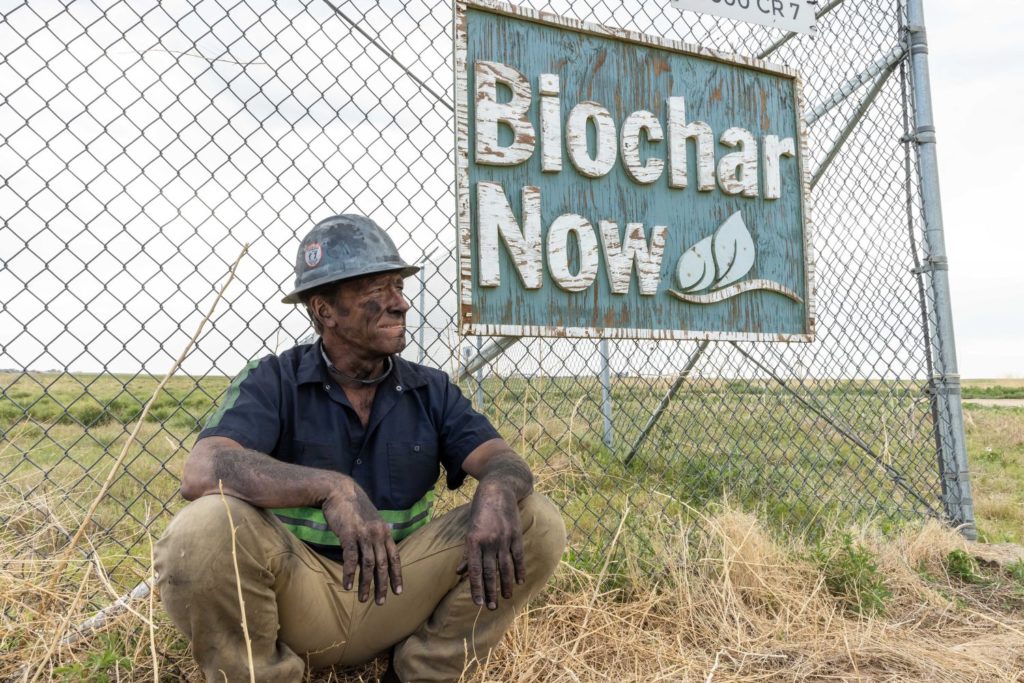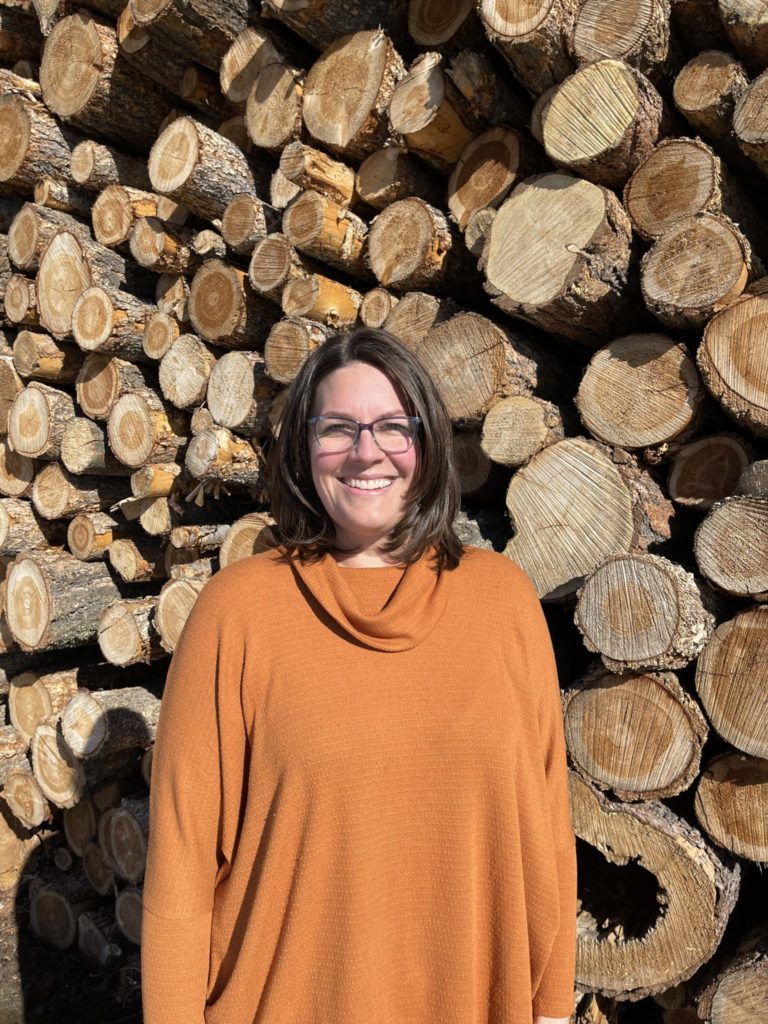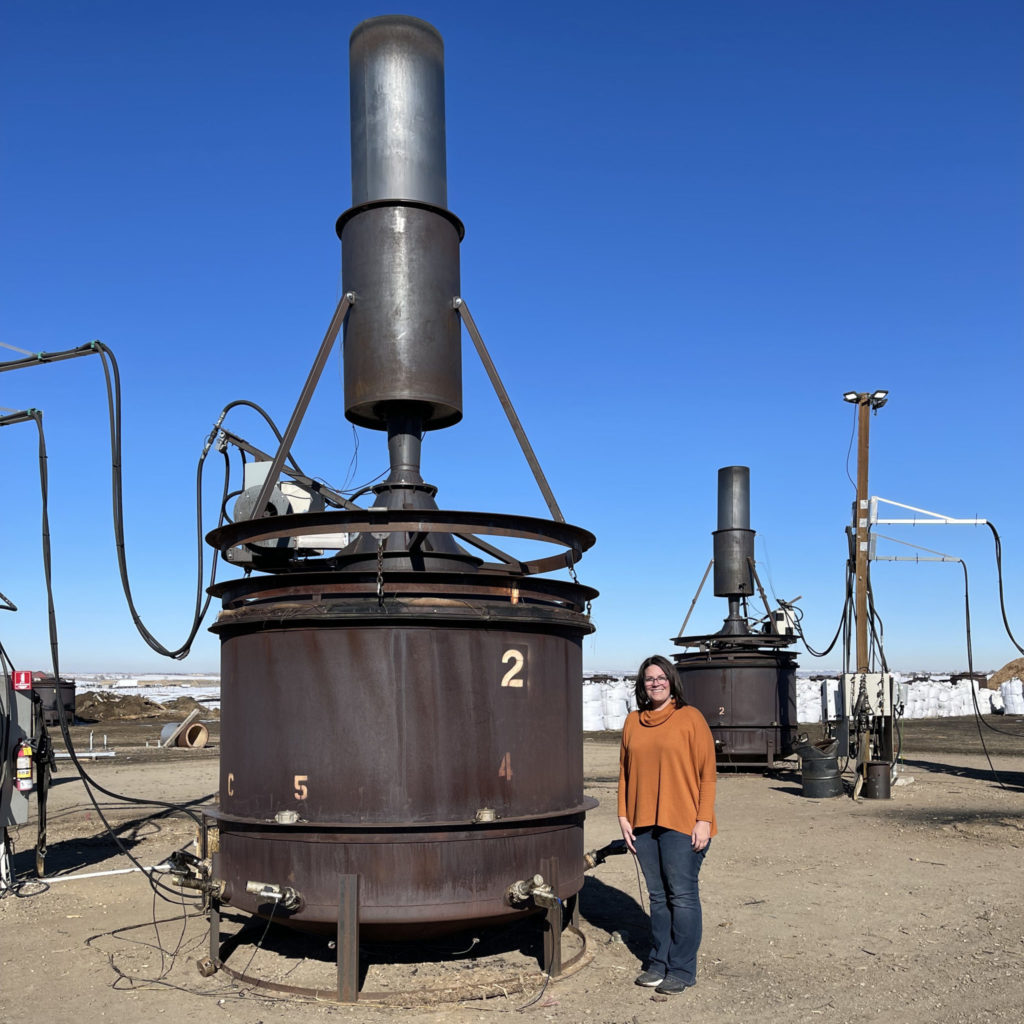
Jordan Gaspard knew that working at Biochar Now, the Berthoud-based company where she serves as managing director, could be a “dirty job” — but she never expected to appear on the Discovery Channel show “Dirty Jobs” alongside host Mike Rowe.
“When Mike was here, he said, ‘This is probably one of the dirtiest jobs I’ve ever done,’” said Gaspard, who received both her bachelor’s degree and MBA from the CSU College of Business.
In the episode, workers at Biochar Now were featured alongside employees who clean out the filtration system at an asphalt plant. The jobs Rowe did in the episode weren’t the grossest, slimiest, most disgusting or most dangerous jobs ever featured on the show — but they were definitely the dirtiest, he later wrote on social media.
Rowe’s claim that working at Gaspard’s company was one of the filthiest jobs he’d ever tried might have seemed bold, but he made an even more surprising claim on the show itself.
“Today, in Berthoud, Colorado, we are going to solve global warming, once and for all,” Rowe declared. His claim was hyperbolic — unfortunately, we haven’t quite solved climate change — but it alluded to Biochar Now’s company mission, which is “to restore the Earth for humanity.” Biochar Now produces a highly absorbent specialty carbon that has a variety of uses, from serving as a fertilizer to aiding in wastewater cleanup.
Biochar is carbon-negative, and for every ton of product that Biochar Now makes, about three tons of carbon dioxide is removed from the air, Gaspard says. Biochar Now’s product is also the only carbon that’s certified by the Environmental Protection Agency.
“The mission statement gives us motivation to keep going,” Gaspard said. “As a pioneer in the industry, it’s really hard — you come up against a lot of pushback. But that is our overarching goal, because our product can tie up a lot of toxins and undo a lot of the damage we’ve done. It helps us focus on growing so we can make it at a large enough scale that it does have a global impact.”
Building a career in a recession
Gaspard graduated from the College of Business with a bachelor’s degree in business administration in December 2008, during the height of the Great Recession. At a time when so many recent graduates were struggling to find work, she was grateful to have a job lined up.
She had been interning at Woodward, a Fort Collins-based aerospace design and manufacturing company, and was hired on in October.
“I actually had to go full-time before I finished my degree to ensure my job,” she said. “I was very lucky to get that.”
More than five years later, Gaspard was working as a senior material planner, a role in which she controlled $35 million in spend across the company’s global production lines.
She was ready for a major career change, so she spent a year working in project management for an oil and gas firm, but she still found herself searching for more. That’s what led her to the College’s MBA program — and to Biochar Now. Gaspard decided to take on two new challenges at once, starting at Biochar Now in May 2015 and beginning her MBA that August.
“It was a very stressful time,” she said. “I’m kind of one of those people who, when I do change, I go big. It’s like, let’s just throw everything up and see what happens.”
It paid off, and her coursework helped her grow quickly at her new organization.
“As I did my MBA, I was able to pull over everything I was learning into the company to help them grow,” Gaspard said. “I joked I got a real-life MBA at the same time, because I was able to immediately put everything to work that I was learning, which was really cool.”
She started as Biochar Now’s supply chain manager and then worked as controller before becoming managing director. She’s now been working at the company for nearly eight years.
“I fell in love with our product,” she said. “We all believe it can truly change the world.”

A specialty carbon
What makes Biochar Now’s product special is that it has a positive and a negative charge at a molecular level, which allows it to bind with salt, nutrients and heavy metals in soil or water.
“In the agricultural world, it’s like putting a battery in the soil that enables everything to do its job better,” Gaspard said. “A tablespoon of our product has 400 square meters of surface area, so a little bit goes a long way. It can hold 5.6 times its weight in water.”
Crucially, the product doesn’t absorb things — it adsorbs. That’s the process by which an extremely thin layer of molecules adheres to the surface of a solid body or liquid with which the molecules are in contact .
“The example is if you have a diaper and you fill it with water, it absorbs and gets bigger,” Gaspard said. “Adsorbing would be if I pour that water in the diaper and the diaper doesn’t change shape whatsoever. It holds that water, but it stays exactly the same.”
The product is made by depriving wood or other plant material of oxygen while heating it. Biochar Now can make use of wood that otherwise might be thrown away, including burned logs from the Marshall Fire in Boulder County.
When Gaspard’s father, James Gaspard, co-founded Biochar Now in 2011, the company worked primarily with the marijuana and hemp industry because the company’s product led to a dramatic increase in plant biomass.
Biochar Now continues to sell to the agriculture industry, including selling to lawn and tree care companies, because its product helps rebuild healthy soils — but it also has other uses. The company sells to a lot of municipal governments and remediation companies for wastewater cleanup. It even holds a patent on a sock designed to aid in algae remediation.
“Basically, it’s a sock filled with our carbon, and you put in the water and it binds up the nutrients, which starves the algae,” Gaspard said.
‘Dirty Jobs’ was fun for employees and good for business
Since Biochar Now’s “Dirty Jobs” episode aired, Gaspard said she has fielded a surge in calls from potential new customers. But perhaps more importantly, she and the other employees had lots of fun making the episode with Mike Rowe.
“It lifted the spirits of the guys so much,” Gaspard said. “They had a great time. They’re still on cloud nine from it. They got him to sign their hard hats.”

About CSU’s College of Business
The College of Business at Colorado State University is focused on using business to create a better world.
As an AACSB-accredited business school, the College is among the top five percent of business colleges worldwide, providing programs and career support services to more than 2,500 undergraduate and 1,300 graduate students. Faculty help students across our top-ranked on-campus and online programs develop the knowledge, skills and values to navigate a rapidly evolving business world and address global challenges with sustainable business solutions. Our students are known for their creativity, work ethic and resilience—resulting in an undergraduate job offer and placement rate of over 90% within 90 days of graduation.
The College’s highly ranked programs include its Online MBA, which has been ranked the No. 1 program in Colorado by U.S. News and World Report for six years running and achieved No. 16 for employability worldwide from QS Quacquarelli Symonds. The College’s Impact MBA is also ranked by Corporate Knights as a Top 20 “Better World MBA” worldwide.